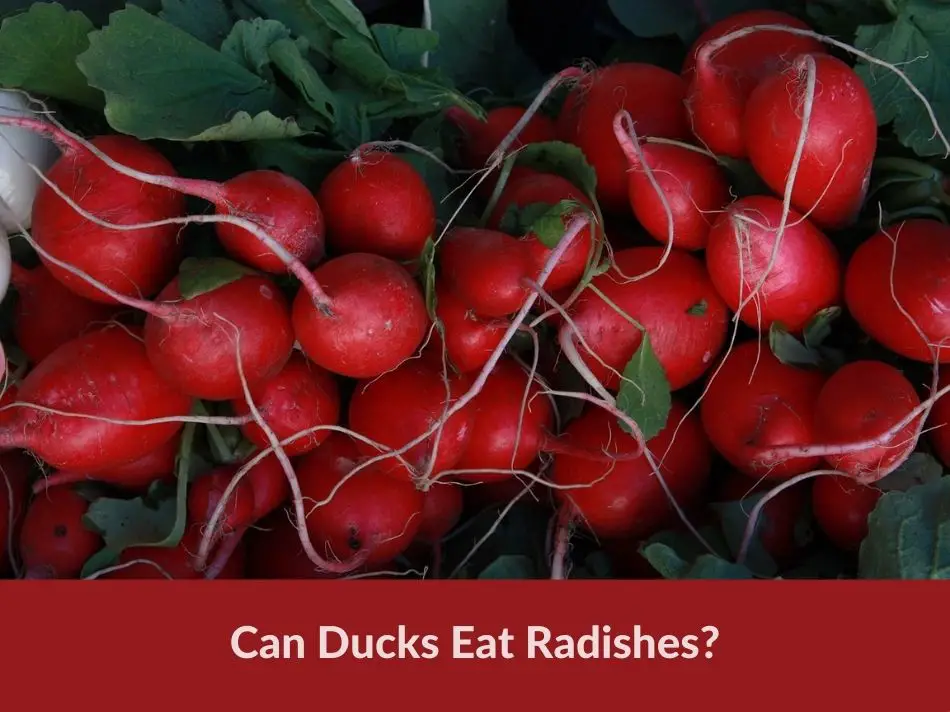Ducks are known for their varied diet. In the wild, they munch on a mix of aquatic plants, small fish, insects, and even grains. When in ponds or lakes, they often dabble on the surface or tip their bodies to reach underwater vegetation. But, can ducks eat radishes?
Yes, ducks can enjoy radishes. Packed with healthy minerals and vitamins, radishes can be a nutritious and crunchy treat for ducks when offered in moderation.
In this article, you’ll discover the ins and outs of feeding radishes to ducks. From the nutritional benefits of radishes to the best practices for offering this crunchy treat, we’ll guide you through ensuring a safe and delightful snack experience for our feathered friends.
How Often Can I Feed My Ducks Radishes?
Radishes can be given to ducks as an occasional treat. Think of it as a special snack rather than a regular meal. Offering radishes once or twice a week in small amounts is a good rule of thumb.
Can Ducklings Eat Radishes?
Ducklings have a more sensitive digestive system than mature ducks. While a tiny bit of radish won’t harm them, it’s best to stick to specially formulated duckling feed for the first few weeks of their life. As they grow and their digestive system becomes more robust, you can introduce radishes in tiny amounts.
Radishes Nutritional Value
Below is the nutritional value of 100 grams of radishes.
- Calories: 16 kcal
- Total Fat: 0.1 g
- Total Carbohydrates: 3.4 g
- Dietary Fiber: 1.6 g
- Sugars: 1.9 g
- Protein: 0.68 g
- Water: 95.27 g
It also contains several vitamins and minerals as listed below.
- Vitamin C
- Vitamin B6 (Pyridoxine)
- Vitamin B9 (Folate)
- Vitamin E
- Vitamin K
- Potassium
- Magnesium
- Calcium
- Iron
- Phosphorus
- Zinc
- Manganese
- Copper
Are Radishes Healthy for Ducks?
Radishes can be a healthy treat for ducks and below are some benefits:
- Vitamin C aids in collagen formation, essential for healthy feathers and skin.
- Vitamin B6 (Pyridoxine) is pivotal for efficient protein metabolism, promoting muscle development and growth.
- Vitamin B9 (Folate) is vital for DNA synthesis, especially crucial for developing ducklings in the egg, ensuring healthy growth and development.
- Vitamin E acts as an antioxidant, bolstering the immune system and protecting duck cells from damage.
- Vitamin K is key for blood clotting, ensuring minor injuries don’t become major issues.
- Potassium and Magnesium play roles in muscle and nerve function, ensuring ducks can move and react with ease.
- Calcium is not only essential for bone health but is especially crucial for egg-laying ducks, ensuring robust eggshells.
- Iron is vital for oxygen transport in the blood, keeping ducks active and energetic.
- Phosphorus works alongside calcium for bone health and plays a part in energy production.
- Zinc boosts the immune system and is essential for healthy feather growth.
- Manganese supports bone development and overall enzyme function, while Copper aids in iron absorption and energy production.
In essence, these vitamins and minerals are the building blocks of a duck’s health, ensuring everything from strong bones and vibrant feathers to robust energy levels and a well-functioning immune system. As with all creatures, balance is key; ducks need a well-rounded diet to thrive.
How To Feed Radishes To Ducks
- Choose the Right Radishes: Use organic radishes. Avoid those that have been treated with pesticides or other chemicals. Wash them thoroughly to remove any dirt or contaminants.
- Sliced/Cut Radishes: For smaller ducks or to ensure easier consumption, you can slice the radishes into smaller pieces. This can help prevent choking hazards.
- Leaves: Radish leaves are also edible for ducks. You can mix them in with the radish pieces.
- Moderation is Key: Like all treats, radishes should be given in moderation. They should not replace the primary diet of the ducks. Overfeeding can lead to digestive issues or nutritional imbalances.
- Water: Always serve with water, preferably toss them in lake or pond. This way they can reach it easily and it will mimic their natural foraging instincts.
More Vegetables Ducks Can Eat
Ducks enjoy a diverse diet, and many vegetables are safe and nutritious for them. If you’re curious about which vegetables are suitable for ducks, we’ve got you covered. Here’s a list of some more vegetables that ducks can safely consume:
Conclusion
In conclusion, whether you’re a dedicated duck caretaker or a park visitor enjoying a day out, offering ducks a slice of radish can be a delightful treat. These crunchy vegetables, packed with vitamins and minerals, provide a nutritious snack when given in moderation.
Just remember to ensure they’re clean and appropriately sized.
Disclaimer: The information in this article is for informational purposes only. I'm not an expert or a veterinarian.


